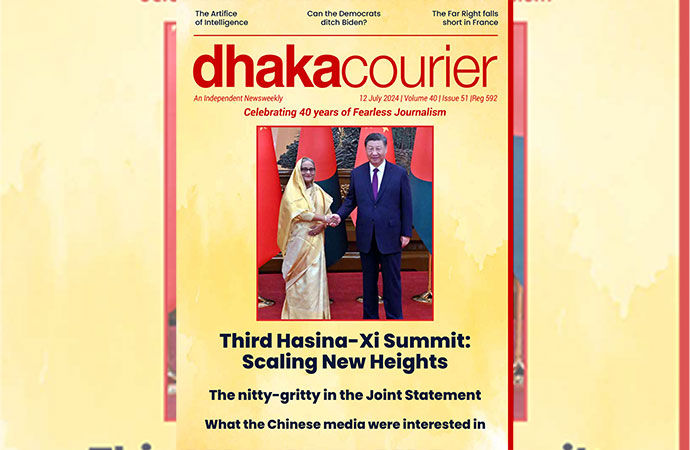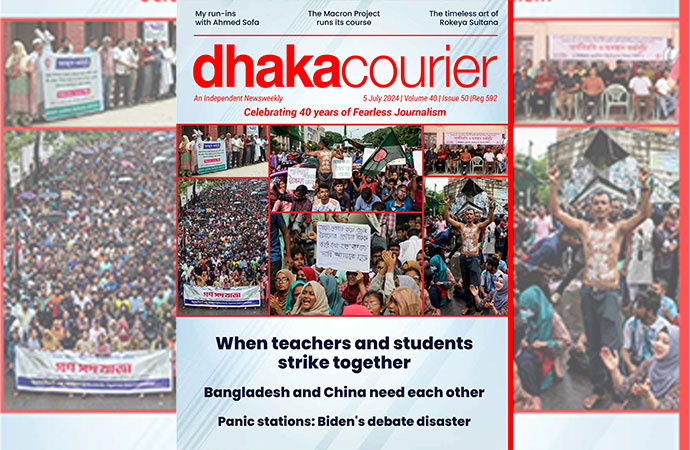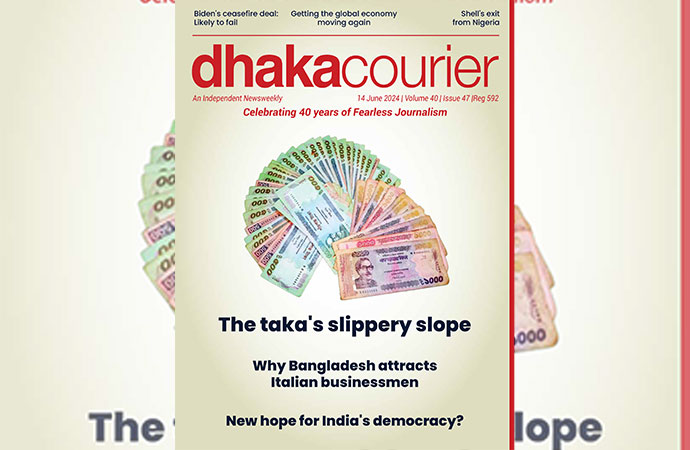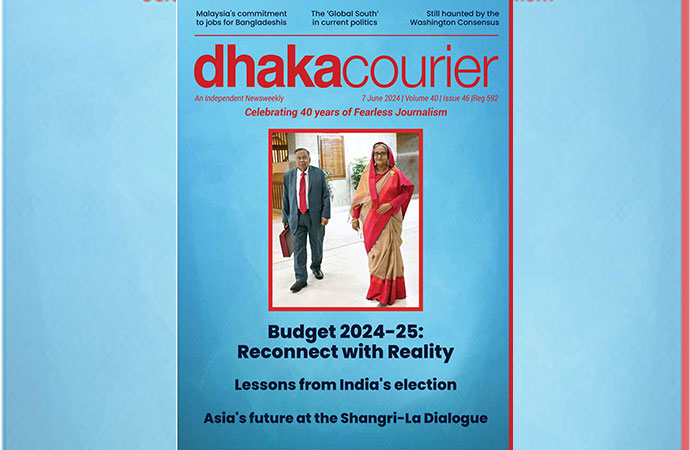Society

Photo: Internet
Exclusive Interview
Professor Amartya Sen is a leading economist in the world today. His outstanding contributions in economics range from the rather abstract theory of social choice to the concrete application of his own theory of famines to the Bangladesh famine in 1974. He has also pioneered a new approach to the measurement of poverty. His contributions to the literature on rights and freedom have generated intense and sustained consideration of these issues by both economists and philosophers. Professor Sen, who is the President-elect of the American Economic Association, holds the prestigious Lamont University Professorship at Harvard University with appointments in both the economics and the philosophy departments. Professor Haider Ali Khan, a regular contributor to the Voice of Bangladesh, teaches economics at the Graduate School of International Studies at Denver University, Colorado. The following conversation, edited and abridged, between Professor Sen and Dr. Khan took place in October 1992 at the residence of Professor Sen in Boston.
Haider Khan: Would you please describe your early life, including the part you spent in today's Bangladesh.
Amartya Sen: My family originally came from Dhaka, and our "adinibash", as one may say, was Manikganj. My family had moved to Dhaka city several decades before my birth, but we used to visit Manikganj almost every year. I spent my early years in Dhaka. At the age of three, my father went to Mandalay, Burma for teaching. So, between the ages of three and six, we lived in Mandalay, though we visited Dhaka annually. I studied in Dhaka's St. Gregory's School. Then, as the war started and the Japanese moved to Burma, my father was afraid that big cities like Dhaka and Calcutta would be bombed. So he sent me to my maternal grandfather's place in Shantiniketan. I stayed on there in Shantiniketan and studied there. I would still visit Dhaka every vacation until 1945, when my father moved from Dhaka University to a new job in Delhi. So we moved out of Fast Bengal before the partition. Some members of the family stayed on. In 1975, when I visited Dhaka, Mohiuddin Alamgir (well known economist) took me to our house in Larmini Street in Wari.
HK: Oh, that's the older part of Dhaka. Buddhodeb Bose use to live there.
AS: Oh, yes, Budd hodeb Bose lived not far from our house. Our house was at the corner of Larmini Street and Hare Street. I u,.ed to go back to Dhaka probably three times a year from Shantiniketan, and would often go to either Manikganj, our ancestral home, or to Bikrampur, my mater¬nal grand parents' home. As a matter of fact, I went back to Manikganj in January 1989 when I was in Bangladesh to give some lectures in Dhaka at the Bangladesh Institute of Development Studies (BIDS).
HK: What were your lectures about?
AS: It was on poverty and hunger. The Voice of Bangladesh, March 1993
HK: Did you focus specifically on Bangladesh?
AS: Inter alia, but not entirely. BIDS, I think, later published a version of these lectures.
HK: Could you go back and tell me where you did your early studies in economics? Was it at Presidency College in Calcutta?
AS: Yes, in my first two years in college in Shantiniketan- I did Intermediate Science. I was very involved in physics. Then I decided to move on to economics, by this time I went to Presidency. There I did Economics with Mathematics subsidiary. Later I studied economics at Cambridge.
HK: Any particular reason for your switch from the physical sciences to economics?
AS: Well, I was interested in politics, for one thing, and economics had much to do with that. I also liked mathematics, and economics permitted the use of analytical and formal reasoning. I enjoyed doing economics. I was also lucky to have a number of very interesting fellow students (for example, Sukhamoy Chakravarty in Calcutta, and Mahbub ul Haq and Samuel Brittan in Cambridge.) Anyway, I finished my B.A. in 1955, and did some research during the next year. The Cambridge University regulations did not permit me to submit my Ph.D. thesis for 3 years after my B.A., and so I went back to Calcutta in June 1956 and started teaching at Jadavpur University. But I was elected to a Prize Fellowship of Trinity College, Cambridge on the basis of my thesis, in 1957, and returned to take up that appointment in Cambridge the following year.
HK: I understand you joined Jadavpur University in 1956 and became the youngest head of the department.
AS: Oh yes, that was quite a scandal. I hadn't quite completed 23 years then.
HK: How could such a thing happen in those days in Calcutta? India is not known for putting young people at the top.
AS: I don't know. It was a new university. They were doing all kinds of novel things. People who were not quite academics were being appointed to senior academic positions, people like Buddhodev Bose, for example. He was never an academic, but he was appointed a professor the same time that I was. While he was an extremely well known figure, I was completely unknown, of course.
HK: It is ironic but true that Buddhodev Bose didn't have a very high opinion of professors.
AS: That's right. Speaking about the hold of older people at the academia, it is not quite true that this was the rule of the day in India. I think the age gap has not been such a big one. When I.G. Patel was appointed a Professor, he was not more than 25. And there were many more such people. In my case, the question was not whether it was a good appointment - I certainly would not have appointed myself! - but whether I wanted the appointment. Since I had wanted to spend a couple of years in India, it seemed like a very good thing anyway.
H.K.: Your first book was "Choice of Techniques"?
A.S.: It was my Ph.D. dissertation, and earlier my thesis for my Prize Fellowship at Trinity.
H.K.: It is still widely read and cited. It have cited it myself.
AS.: Thank you. I am not very proud of it. I did the work rather quickly in 1955-1956. Later on I added to it somewhat. It was a new subject then. It was really inspired by my talking with Maurice Dobb, who was my main mentor.
HK: If I may say so, I was quite inspired as a student by the appendix of your book where you discuss several empirical cases.
AS: Yes, there are some applications there. I was very interested in seeing the empirical implications of my theoretical solutions especially in cotton textile. The picture was very asymmetrical there. Hand weaving had a good economic case, but almost no case existed for hand spinning. Of course, the situation has changed somewhat now because of the increase in demand for products made specifically with handspun material. Handspun textile has become a luxury item, even though it is still sub-sidized also than the content. As we all know economics is getting to be more and more of an abstract subject. Younger Ph.D. students do not want very much to deal with numbers in a genuinely empirical setting. I suspect partly because these numbers are usually quite messy. Having done some mathematical modelling on choice of techniques myself, I wanted to apply these models to the developing countries. But people I know would say to me, "why do you want to do that?" I would then respond that there is this famous book by A.K. Sen and you just have to look at the appendix and see what he does.
AS: I am flattered by that. Actually, the book was a lot of fun to write, I must admit. Well, the thesis itself wasn't so much mathematical, it was rather conceptual, but it was nice to get away from the conceptual thing and illustrate that actually it does relate to problems with which we are concerned. The hand spinning lobby was quite upset by the appendix when it came out first in the Economic Weekly in India.
HK: Did you move to the Delhi School at this time?
AS: I taught at Trinity first. I had a Prize Fellowship there from 1957 to 1961. Then I was elected to a teaching position at the college. I also gave lectures at the University. I was getting interested in welfare economics and offered a course in that subject. I also taught Principles of Economics. I remember I had to teach this large course at 9.00 o'clock in the morning. It was quite a challenge for me since my normal time for getting up was 10.00 a.m. in those days. And in those days you had to put on a jacket and a tie... in other words, be properly attired. The lectures took place in an enormous hall with hundreds of students present. I usually had to skip breakfast on those days.
HK: How did your interests shift to the theory of social choice?
AS: Well, it was connected with my interest in welfare economics. You see, I was beginning to get really interested in the welfare economics. In the Choice of Techniques I also discussed that the really important part of economic choice is the form of the objective function and what weight you attach to the immediate consumption and welfare as compared with future consumption and welfare.
HK: Indeed. I remember that part of your discussion as being particularly helpful when I was writing my own dissertation at Cornell (University).
AS: Thank you. My book was an attempt to translate a technological problem into a human The Voice of Bangladesh, March 1993 evaluation problem. That was partly my motivation for going into welfare economics. I was interested in understanding how to evaluate these different choices, especially for the third world countries like India or Bangladesh. But welfare economics was domi nated by a certain kind of nihilism at that time. You could not make interpersonal comparisons of utility. That was thought to be "methodologically" wrong. And if you tried to combine people's preferences you ended up, it appeared, with some impossibility theorem. There were some people, including one of my teachers, Joan Robinson, who said that the entire field was a mistake. My initial interest in welfare economics was also partly to combat that view. From there I moved to Social Choice. Maurice Dobb, by the way, was very supportive of my interest in this.
HK: Was there not a tradition of welfare economics at Cambridge - the Marshall- Pigou tradition, so to speak?
AS: Yes, there was - or had been. I did read a lot of Marshall and Pigou, and Dennis Robertson, who still taught when I was a student in Cambridge. But I have never been very happy with the utilitarian tradition. I thought that the debate on utilitarianism that was carried out in 1930s by people like Lionel Robbins that led to the demise of welfare economics was fought on the wrong battleground. The utilitarian's declared utility to be the only item of interest and used interpersonal comparisons of utility to arrive at ethical judgements. Critics such as Lionel Robbins, instead of asking whether utility was the only item of interest, latched on to the issue of interpersonal comparison of utility. With all due respect to them my own view, which has not changed very much, is that you cannot get very much out of utility comparisons anyway. So whether interpersonal comparisons could be made is not the central issue. In addition, I do believe that such comparisons could be made. But such comparisons would provide rather inadequate basis for welfare judgements. That also took mot to Social Choice Theory. I tried to see the context out of which the Arrow Impossibility theorem arises. In the process I arrived at some impossibility theorems of my own which don't require all of Arrow's Conditions. I also suggested some ways of getting out of it. So by that time I was fully engaged in the Social Choice problem.
HK: You have also raised the issue of welfarism. What were the reasons for this? More broadly you have characterized utilitarianism as a variety of consequentialism. Is it correct to say that while you criticize utilitarianism, at the same time, you are willing to defend certain forms of consequentialist reasoning?
AS: I think that's exactly right. One component of utilitarian-ism is that in order to judge an action you have to look at the consequences of that action. I do not have any great problem with that. Then they suggested particular ways of judging the consequence, namely to concentrate only on the utility consequences. I found that inadequate. I called this welfarism, namely taking nothing but the utility of an action into account. The inadequacy of welfarisrn as a social criterion becomes clear if we consider countries with large numbers of people in misery. If you are born in a disadvantaged situation and you are completely hopeless about the possibility of rising to the position of the people who are better off in society, you don't go lamenting about it throughout your life. You adjust. And you take pleasure in whatever relieves the misery however temporary the relief is. I remember people who worked in households where they had no holidays at all normally. If they had one holiday during a festival about four times a year they got an enormous amount of joy out of that.
Now, of course, in some ways they were compensating for their usual life of drudgery. So if you look at their suffering as a utilitarian you might say that they are not suffering that much. Or if you look at the fulfillment of desires, those desine are already so much cut down, they are so hopeless already that whatever desires they have left are probably being nearly fulfilled. But to say that they have their desires fulfilled in the same way as the rich people in society have their desires fulfilled would be monstrous, I think. And so I thought that the entire scale of utility was tremendously biased against the majority of the population in any unequal society. This applies to developing countries particularly. It is also true with respect to the underclass in the USA. It seems to me that utilitarianism, which ignores this attitudinal change, uses a distorted yardstick. Furthermore, as human beings we are not just concerned with the achievements we have made but also with the freedom to achieve what we want. Freedom in both its negative and positive senses can not be captured by looking only a: achievements, in particular in the space of utility achievements.
HK: You have also introduced the concept of well-functioning in this context...
AS: Yes. That's one way of looking at it. If you do not want to look at just utilities, what do you look at? Some people may be happy just to look at income levels. That's an alienated criterion. You are really interested in not incomes per se, but what incomes can enable you to do. So one needs something that relates directly to human beings. From that point of view a natural starting point is given by the conditions human beings. That is to say conditions such as being well nourished, freedom to move about, etc. I would also include the condition of being happy or not happy, though it is not a measure of other conditions, as utilitarians tend to take it to be. The idea of functioning is neither alienated as commodities or income, nor is it psychological and subjective such as the utilitarian criteria of pleasure or desire fulfillment. A second advantage is that it can take us to the idea of freedom as capability to achieve in general. After I formulated these my attention was drawn to the fact that Aristotle had discussed some of these issues as well.
HK: I was about to raise the same issue in the context of the discussion of moral good by Aristotle.
AS: I didn't actually get there through Aristotle. But Adam Smith discussed these in terms of of his analysis of necessities.
HK: In the Wealth of Nations, or in his Theory of Moral Sentiments?
AS: In both. In the Wealth of Nations he observed: What is regarded as necessity in one country varies from that in another country. Does this mean that there is a fundamental difference between people from different countries as human beings? He says, well, not really. It maybe that in the then England people were ashamed of appearing in anything other than leather shoes but not so in Scotland. But in both cases what they were trying to achieve was the ability to appear in public without shame, or to take part in the life of the community. The same capability may relate to different levels of income or commodities in different parts of the world. He wanted something more fundamental than commodities or utility here. Really, it was my reflection on those pages in Smith that led me to think that there is something deeper here which I then pursued.
HK: I remember that as a graduate student I read some of your essays on poverty which you wrote under the auspices of the World Employment Programme at the ILO. One of those essays quoted from Adam Smith along these lines. Was that the time when you started thinking in terms of capabilities?
AS: When was this?
HK: I read these in 1978, but I recall that the essays actually came out around 1976.
AS: Yes, that's right. It was about that time. This was shortly after I had given some lectures on inequality called the Radcliffe Lectures. They were published in the form of a book on economic inequality.
HK: I actually use it in my graduate seminar.
AS: Oh, really. Thank you. I was unhappy with it because everything is done in terms of income and utility and nothing else came into it. There was a tremendous conceptual lacuna. I was also trying to do some work on technology and employment in developing countries. That work led me to the idea that the ability to have a worthwhile job was part of the ability to lead a worthwhile life. You can not capture these characteristics in the space of utilities or incomes as such.
HK: Yes, in your book on Technology and Employment you discuss these characteristics.
AS: Yes, you are right. My God, you are familiar with that part of my work too! I was really groping for different concepts at that time and was reading a lot of Adam Smith during this period, both the Theory of Moral Sentiments and the Wealth of Nations. Contrary to the general view, not entirely incorrect, that there is a great gap between the two works, the intersection of the two works is also very interesting and useful. Later on it was drawn to my attention that Aristotle had also discussed these and that he had discussed them very well indeed. Smith does not cite Aristotle on this but it is likely that like any well educated gentleman of his time he had read quite a bit of Aristotle as part of his general education.
HK: Quite so. And not only Aristotle, but this approach to moral theory by way of human capacities and potential continued through to Spinoza in particular.
AS: You are quite right. Smith, of course, was influenced by the Stoic philosophers in his early life. It may be that these influences hide the Aristotelian features of his approach. Certainly he was emphasizing the Stoic stance of being an outsider - even to your own affairs. These were also the hey days of rationalism. Smith's contemporaries like Condorcet were also cultivating rational approaches to human affairs.
HK: Interestingly, Richard Boyd, a philosopher of science at Cornell and Alan Gilbert, a political theorist, argue for moral objectivity in a similar way. I myself defend a version of moral progress which is quite close to this.
AS: In my 1990 Storrs Lectures at the Yale Law School, I have made a case for objectivity from a positional perspective. It is an attempt to capture objectivity by taking note of the observer as one of the internal characteristic features of a situation. There is such a thing as objectivity from a certain position. For example, in Satyajit Ray's film Agantuk (The Visitor), some characters discuss that the sun and the moon look the same size from here, and the fact that the shadow of the earth on the moon during a complete eclipse is also the same. All this is true only from the "position" of the observer on earth. It is a very positional statement. We can say that appearances to a certain observer from a specified position can be "objective". However, it is more than just an appearance, because there is a sense in which the projections of the earth and the moon are the same size as that of the sun shown by the fact of the eclipses. I only saw Ray's film last month, but it is a good illustration of such "positional objectivity".
HK: Let us go to some specific questions with regards to you work on poverty and famine. Your theoretical paper on poverty appeared in Econometrica in 1976.
AS: Yes. It was not the first, however. Economic and Political Weekly published an earlier version in 1973. There was a slightly different axiomatization in the Econometrica paper. I was concerned with the fact that people measuring poverty left out so many features. Measures such as headcount do not say anything about how poor the poor are, or the inequality among them. I was also worried that in terms of politics of poverty measurement, all governments are interested in pushing up people who are close to the poverty line, because with the least effort you get them above the poverty line and you get a lot of credit for reduction in the poverty level if it is measured just by the headcount. But if you take into account the distribution among the poor and if you take into account how far you are below the line, then a measure which takes note of that should be more sensitive to the bigger challenge of poverty. I was pleased to see that this axiomatization led to a relatively simple and meaningful statistical measure.
HK: When did you start your work on famine?
AS: I started, in a sense when I was a school boy. The Bengal famine of 1943 took place when I was a school boy in Shantiniketan. I remember writing something about it in school. But of course, I did not start working seriously on famine until I was in London, around 1974.
HK: The Bangladesh famine occured in 1974 also.
AS: Yes. That's right. I must have started working on it before, because I remember writing to Rehman Sobhan (well known Bangladeshi economist) that when I come to Dhaka I would like to talk to the people at BIDS about the famine. As regards my work on the Bangladesh famine, I had collected some material when visiting Dhaka, and the BIDS kept sending me more material. Originally, Mohiuddin Alamgir was in charge. Then he came abroad. For a while I did not know what was going on because Mohiuddin was outside. Then Mohiuddin produced a book, a very good one, on the Bangladesh famine. Alamgir also had the great advantage of having studied poverty before he studied famine. He is above all an excellent economist who just happened to be interested in famine. This book was very helpful and I found its approach quite congenial. I had already published something by this time and Mohiuddin had disputed some parts of it. One of the issues had to do with the measure of availability of food. Later Martin Ravallion did much more elaborate work. The reduction in supply really came after the famine. Increase of prices after the flood, and the anticipation of future shortages and the distress of the rural laborers who lost their jobs played the key role, especially in areas like Mymensingh, Sylhet and Rangpur.
HK: So it was indeed the entitlement failure that caused the famine in these places?
AS: Yes, well, you see, enti¬tlement m ent failures probably play a role in any famine. I don't take any great credit for saying this. It is just analysing something that is almost obvious, in a systematic form. If people are dying from starvation it must be the case that they do not have the capacity to buy food. The real thing is to focus on the plurality of causes from which such failures arise, to analyse the respective roles of different influences.
HK: You have argued in a recent book that public intervention may be necessary to prevent starvation.
AS: Yes. I think starvation conditions can be dealt with by such interventions very well. In a sense the 1974 famine occured in a politically and economically chaotic situation, but the conditions in 1979 were managed quite well. Now that the country is in a relatively more democratic setting it will be very difficult for the government to ignore famine conditions.
HK: I became aware of a very interesting observation you have made regarding democracy, famine and hunger by reading one of your essays translated into Bengali recently. You contrast India and China. You point out that a massive famine in China was hidden from the rest o the world, whereas given the rela¬tively free press in India this would be impossible for India to do. At the same time China did much better than India in generally alleviating the day to day deprivation of food.
AS: Yes, that's right. That I find quite an interesting contrast. In China the 1958-61 famine was connected with the failure of the Great Leap Forward movement. The important thing is not the failure itself, but that the policies were not revised for three years. It is estimated that 30 million people died. I don't think any country with a free press and election would have reelected a government which refused to even acknowledge the problem. Fear of electoral defeat and of political opposition makes governments in democratic politics very responsive to threats of famines. But the democratic process does not work so well in eliminating chronic, non-extreme deprivation and poverty. Because it is very difficult to dramatize the day to day deprivation, the opposition parties may have less success, as in India, to alleviate such sufferings. But the imagination and activism of the opposition is also an important factor here. My complaint about Indian politics is that quite often they concentrate on dramatic scandals. But the scandals of regularly high mortality rates, the serious scandal of higher morbidity and death rates of females as opposed to males, politicians do not urgently focus on. Nor do they pursue these with any vigor.
HK: I have tried to argue that the right to food should be a basic human right embodied in the constitution.
AS: It is a plausible position to take, something like this position is taken by the independent advisory group headed by Kaiser Murshed. They prepared a document for SAARC (The South Asian Association for Regional Cooperation).
HK: That is very encouraging. Let me bring up another issue which to my knowledge very few people have been willing to discuss. Your recent work brings to light the gender inequality within the family.
AS: Gender inequality within the family is very large in Asia. One way of seeing the evidence is this: there is considerable evidence that if girls and boys receive similar treatment in terms of nutrition, health care etc., mortality rates are lower among the women than men. That is shown by a higher proportion of women than men in the population of all developed countries. But in Bangladesh the ratio is 94 to 100; in China it is about the same, in India it is 93. If you look at a state like Kerala, which has a high level of basic education including female education, it is the same as in developed countries - around 104. If you look at the Punjab it is much lower. These differences arise from differences in mortality. My suspicion was initially that it was caused by unequal distribution of food. But I now think that the major cause is unequal health care. I did some village studies in West Bengal and the data are consistent with this view.
HK: There are at least two aspects of these, it seems to me. One is the exposure to health hazards, and the other is the relative neglect of girls and hence lack of proper treatment.
AS: I think it is both, but it is more the lack of equal treatment. I did a study on Bombay hospitals looking at the admissions records. There is evidence that girls are less easily hospitalized than boys, and women less easily than men.
HK: I want to finish with a general question in two parts: first, what would be your advice to countries like Bangladesh and India. Secondly, what is your advice to the young economist from these and similar countries?
AS: These are very difficult questions to answer. On the first, there are many things to suggest, many possible departures. But one should not pose oneself as a dictator; nor assume that others aren't doing anything. There is a nice line from Tagore: Tomar hate nai bhuboner bhar (The weight of this world is not in your hands.) At least there are other people doing things. In terms of things that are relatively neglected, I will mention two that seem to me to be important for both India and Bangladesh to pursue. One is to go much more for literacy in general and female literacy in particular. The other is to provide basic health care for all, especially in the rural areas.
On the other question it partly depends who you are arguing with. There are some economists in both India and Bangladesh who arc highly theoretical and look down on applied work. Then there are people who have no time for theory at all. Both these I think are terrible errors. I think theory is extremely important. But the ultimate motivation and the challenging test have to be practical. It is a question of making use of theory - even developing some theories of one's own - along with being interested in and involved with practical problems. There are many problems in economics which require quite sophisticated mathematical treatment, but that treatment should not become an end in itself. I would urge the young people to combine theoretical analytical economics with practical policy problems.
HK: Your own work stands as an example to follow in this instance.
AS: Well, that I don't know. That I don't know.

























Leave a Comment
Recent Posts
How China's reform benefit the ...
"It's very clear that China has entered a new era under Presi ...
How do we heal?
After the unprecedented violence of the past two weeks, the most impor ...
The High Court fixed July 25 for delivering verdicts
Biden’s legacy: Far-reaching accomplishments that di ..
US President Joe Biden dropped out of the 2024 race
“A kiss over bribe”: Nachiketa’s social message to D ..